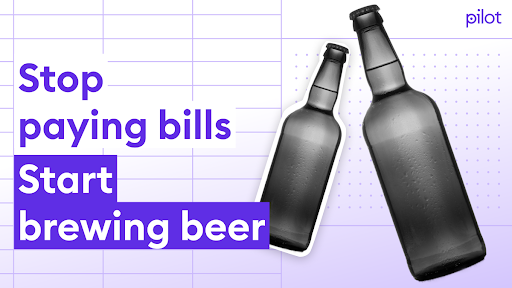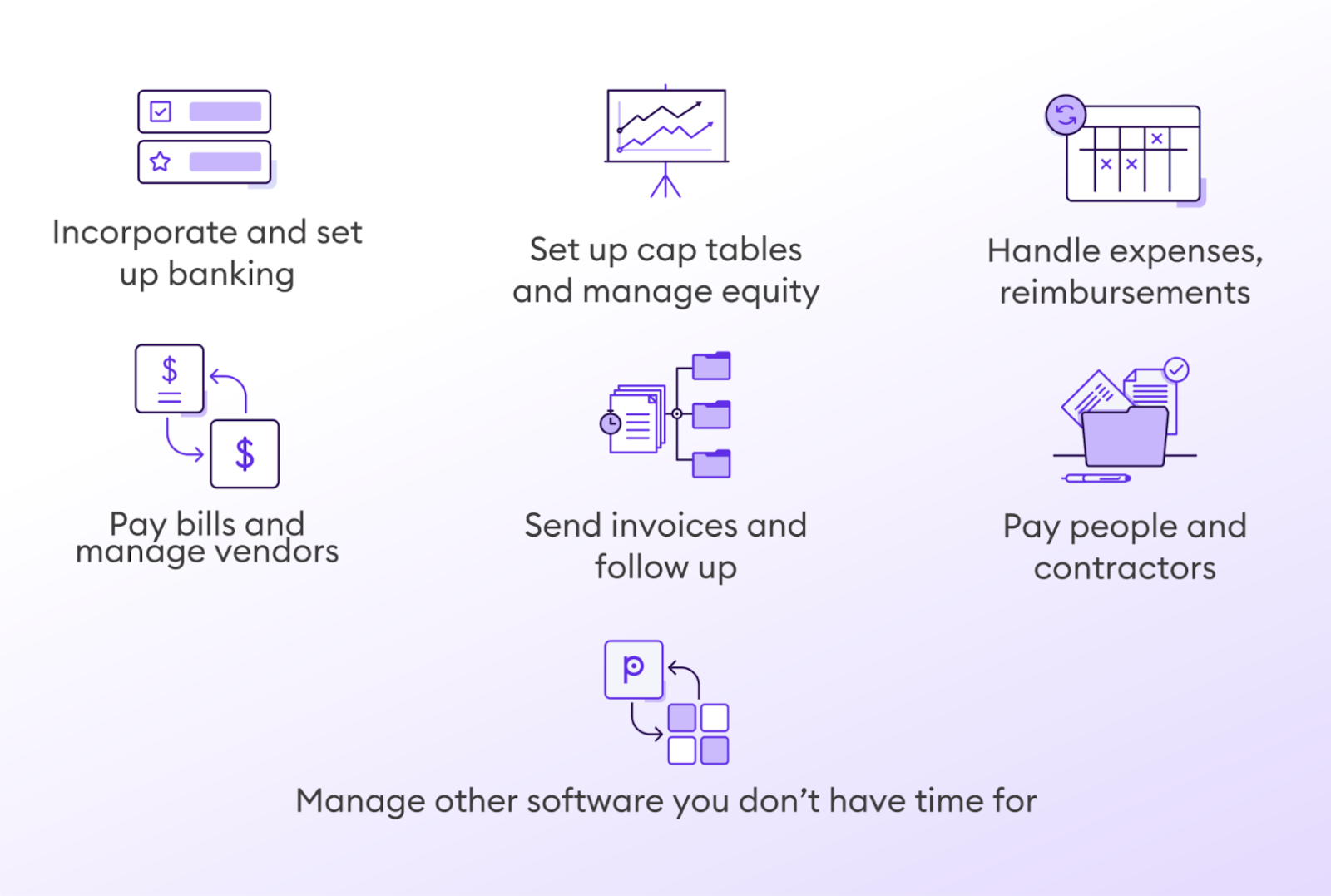Bills won’t make your beer taste better

The classic business book Profit From the Core has one message for founders: Focus on what you’re best at. Profit comes from your core competency.
This is true at the company level. It is also true at the founder level. As you get away from that core and stray into things you aren’t the best at, you can lose your way.
So why do founders and business owners forget this as they grow? They wind up spending most of their time on all the tasks that don’t make their beer taste better, as the adage goes. Having helped 2,500 startups scale, we see it over and over as the founder and company take on more and more. But eventually, to be successful, founders must learn that the business simply cannot afford them doing admin work.

Death by a thousand paper checks
When startups run into trouble, their CFO hears it first. As the outsourced CFO to many, we’ve noticed a trend: Founders and owners who lose focus fall behind. Then they come to us to create models to forecast sales for new product offerings, new compensation plans for new types of employees, and new bonus structures because they found the beginnings of core product market fit and want to capitalize it by doing more. But who’s going to manage this new sprawl of ventures? Usually the founder or owner.
Those founders underwrite all those new initiatives with their own time. They work nights and weekends to figure out cap tables and equity, logging in to handle that new payroll, process payments, and pay bills. None of this makes their core beer taste better. Just the opposite—they are taking even more of their focus off their core and spreading it thinly across a variety of bets. That means they’re only being 50% effective in the core area that matters most.

That’s the exact same thing that happens to late-stage startups according to Profit From the Core. Startups with a superpower tend to then branch into multiple industries and launch many product lines; they develop hierarchy and structure, complex pricing tables, and lots of policy documents to ensure people are communicating. Then suddenly, they’re using Microsoft Teams. They’re having meetings about meetings. And people think twice about taking risks because of their own legal team. Performance drops and everyone asks what happened?
The comeback story is always the same: The founder divests from all those new bets and sheds the process and returns everyone’s focus to the thing they are best at. This is what turned around Apple, Microsoft, GE, Disney, and Marvel—they sold off the periphery interests, outsourced things they weren’t experts at, and aimed to be legendary in the area where they were naturally 10x better.
Which is pretty good advice for most founders. If your superpower is coding, product design, or charming customers, your startup’s momentum is directly tied to how many hours you can put into that. All else doesn’t matter if you can outsource it. And you should.
Here are five big areas to consider handing off:
It is almost never worth your time to learn the ins and outs of accrual accounting and balancing a general ledger. There is infinite detail to get into, and if you aren’t a practicing accountant, you’ll never be the best in your field. It won’t be an advantage. Plus, you want the person who owns this to be methodical. Far more effective to outsource it.
2. HR, payroll, and benefits administration
As founder, you are the chief recruiter. But HR’s back-office admin side is not a good use of your time. Use a software like Gusto or Rippling and find someone who can ensure that payroll is processed on time, new employees get onboarded according to state law, and you register to hire in new states.
3. Invoicing and receivables
Use a software such as QuickBooks, Stripe, or BILL to automatically generate invoices or accept payments and automatically follow up if those payments fail or invoices go unpaid. This can cover you for 80% of situations, if you set it up right. Consider hiring an expert to implement a “receivables” process and personally handle those 20% of edge cases that require human judgment and clear communication.
4. Payments and contractors
No founder should be gathering information on contractors and inputting it to Gusto, Rippling, Deel, or similar, nor issuing 1099s at the end of the year. Hand this off to someone to free yourself up.
5. Incorporation and banking
You don’t need to wait in line these days to open a business bank account and credit card. You can do this online immediately through a neobank like Mercury, Brex, or Ramp. And probably, you shouldn't be the one doing this. The same goes for incorporating the business. It’s all too easy to misfile, and then good luck amending things. Have an expert do it for you in a fraction of the time and manage tasks like this ongoing.
Some founders do love being in the details, and that’s fine. You can be aware of the details without being responsible for those tasks. That way, if you get busy, they don’t go undone. Which style suits you best? For each, there’s a right type of outsourcing.
If this is you
1. “I never want to think about it.”
2. “I want to stay involved, but not be responsible.”
3. “I want to do it myself, but want the best possible process."
Use this outsourcing method
Complete—Hire someone to set up and run your back office.
Partial—Hire an outsourced expert to set up processes, train your ops team and admins, then hand most of it off.
Advisory—Skip straight to the perfect process by hiring an expert who’s done it all before for others. Have them train your team to free you up. Potentially, they can stay on to hold that team accountable.
Which leads us to Pilot’s most-requested feature ever: We now do all these ops functions for you. Because while we’ve always handled the bookkeeping, tax, and finance strategy, we didn’t manage your systems. Now we do.
And whether it’s us, a contractor, or another group, you really can’t afford not to free yourself up. Your core product deserves your focus. Your momentum depends on doing the thing you do best and making your beer taste better, not paying the bills.






